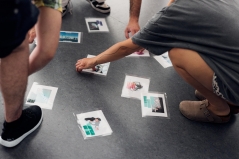Learning interdisciplinarity: The solution to societal challenges?

keywords:
Collaboration / learning / Interdisciplinarity / Sustainability / Teamwork
Learning interdisciplinarity: The solution to societal challenges?
Anyone who has worked in a team knows the challenges: differing perspectives often clash. However, what happens when it’s not just opinions that diverge, but entire disciplines? How can we learn to think beyond boundaries and what competencies can help us do so? / more
Starting early: How caregivers can support their children's emotion regulation

keywords:
emotion regulation / child development / parents / caregiver-child interaction / caregiver-environment interaction
Starting early: How caregivers can support their children's emotion regulation
Emotion regulation in children can be challenging: screaming, loud crying, temper tantrums at the supermarket checkout - many people are familiar with such situations. What role do caregivers play in these moments, and how can they effectively support their children? The good news is that even small actions can have a lasting positive effect, strengthening children’s emotion regulation for life. / more
Does emotional labor also exist in sex?

keywords:
Emotional Labor / sexuality / gender roles
Does emotional labor also exist in sex?
Emotional labor refers to suppressing or altering one’s own feelings in order to enhance another person’s well-being. But does sex involve emotional labor? / more
In-Mind has relaunched its blog post
In-Mind has relaunched its blog post
We are excited to announce that the English version of In-Mind has relaunched its blog. The goal of In-Mind’s online blog is to communicate psychological research in a way that is scientifically accurate, accessible, and engaging for a broad readership. Articles span a broad spectrum of topics, with particular emphasis on current social, political, and scientific issues. Blog posts are 300–600 words long, with 1–5 scientific references. Posts summarize the results of an interesting publication, explain... / more
Internet, dating, addiction: A match made in heaven

keywords:
online dating / internet addiction / social media / smartphone addiction / problematic internet use
Internet, dating, addiction: A match made in heaven
Dating apps are said to have turned dating into an addiction. Instead of efficiently connecting people for in-person dates, users may get lost in “binge swiping”. But what makes it so hard to stop swiping – and when does it become a problem? We review existing research and explain what researchers mean by “online dating addiction”, why the science isn’t so simple, and what you can do to resist the pull. / more
Digital moral distortion: How social media can negatively shape our judgement of right and wrong

keywords:
morality / social media / moral judgement / moral outrage / misinformation
Digital moral distortion: How social media can negatively shape our judgement of right and wrong
Social media is far more than a tool for communication, it is a digital social environment at scale. Unlike any other space before it, social media platforms expose us to the judgements of others. From expressions of admiration to condemnation, we are immersed in the opinions of others with unprecedented frequency. In this article, we explore how such online environments hold the potential to distort our perception of societal consensus on core moral issues and influence our understanding of what is considered right and wrong in society. / more
The viral power of migrant crime messaging: Fear, emotion, and algorithms

keywords:
migrant crime messaging / fear appeals / social media algorithms / misinformation / digital psychology
The viral power of migrant crime messaging: Fear, emotion, and algorithms
Fear-driven stories about migrant crime continue to circulate widely across social media platforms. This article examines how emotional triggers, psychological shortcuts, and platform design interact to influence public perception. The result is a digital environment where fear spreads faster than facts and reinforces harmful stereotypes. / more
Dressed for the feed: The psychology of fashion in a filtered world
Dressed for the feed: The psychology of fashion in a filtered world
Fashion balances expression and expectation, but on social media, it reshapes body image through constant comparison and self-objectification, often leading to anxiety and dissatisfaction. This article explores the psychological costs of online fashion and the pressures it places on self-perception, while also showing its potential to nurture self-awareness. / more
Covert control: How political elites and influencers use manipulation on social media

keywords:
political influencers / manipulation / misinformation / social media / media literacy
Covert control: How political elites and influencers use manipulation on social media
The popularity of users like politicians and political influencers on social media demonstrates their power and sway over public discourse today. But how do these political users gain and maintain power? This article explores how the current media landscape is dominated by political influencers and elites, making it harder for users to know what’s trustworthy and detect misinformation. By spotlighting the tactics that some of these sources use to build influence with their audiences, we bring attention to how political information is shared and processed in today’s digital landscape. / more
Scrolling against hate: Developing critical media competence to counter online antisemitism

keywords:
antisemitism on social media / young adults / critical media competence / digital culture of solidarity and empathy
Scrolling against hate: Developing critical media competence to counter online antisemitism
Social media connects – but also divides. This article explores how antisemitism appears online, why young adults are especially vulnerable, and what we can do about it. Based on existing research, it offers practical tools to build media competence and promote responsible, intentional communication in the fight against online hate. / more


